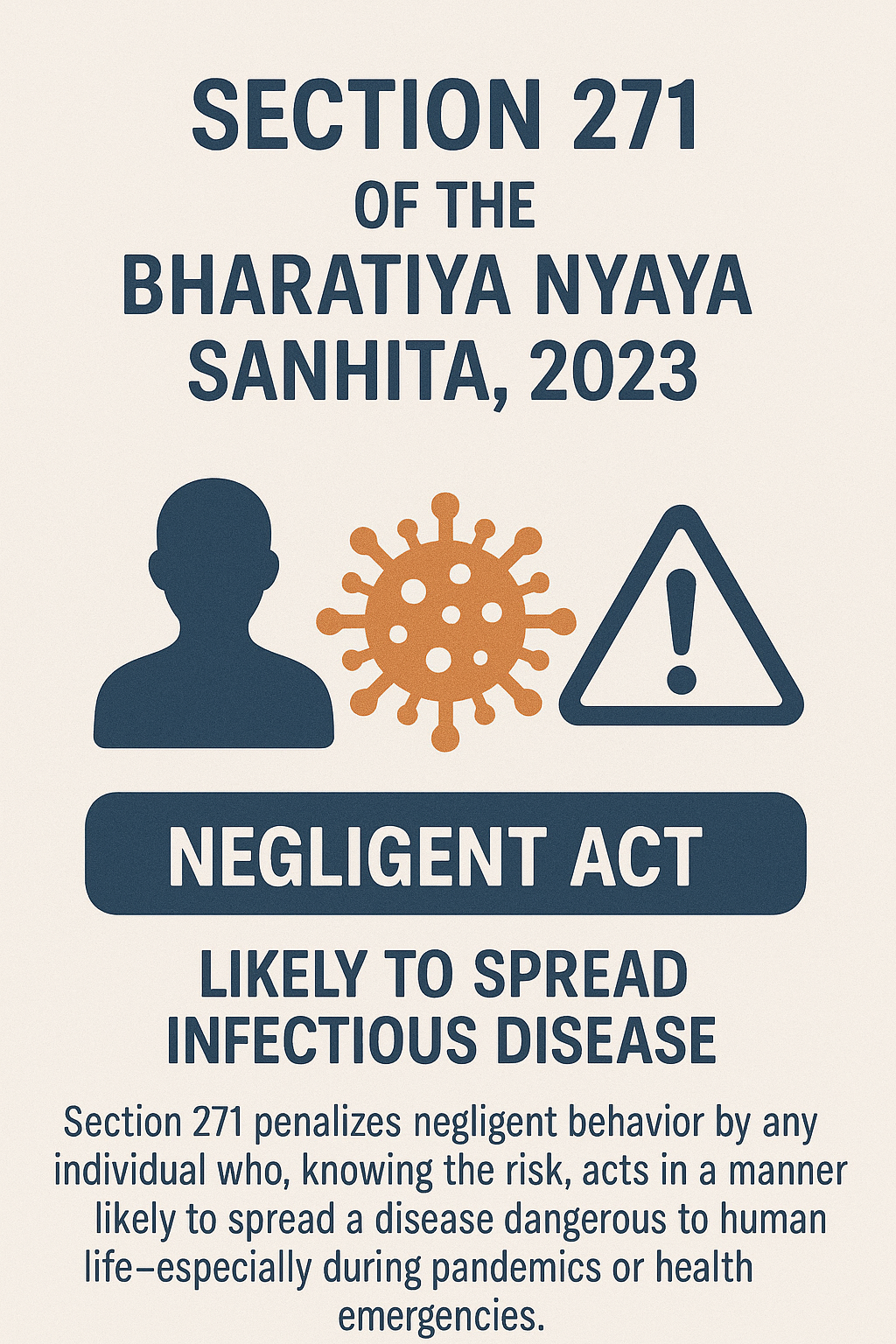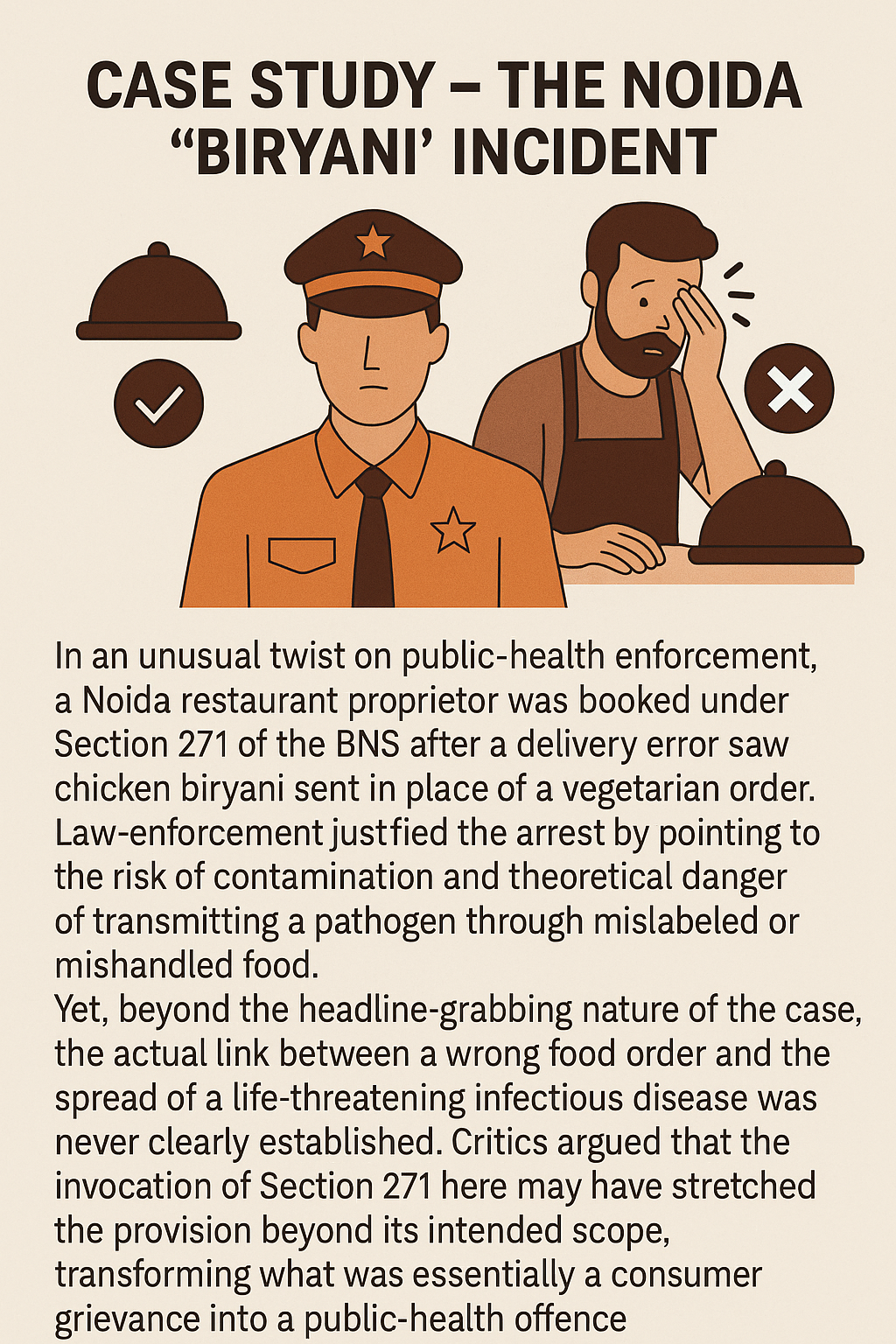Table of Contents
Why in the news?
The Bharatiya Nyaya Sanhita, 2023 the India’s reformed penal code, incorporates several provisions to safeguard public health. One such measure is found in Section 271, which is specifically aimed at addressing behaviour that may risk the spread of infectious diseases known to be hazardous to human life.
This section criminalises negligent conduct by individuals who, despite being aware or reasonably expected to be aware of the risks, act in ways that could contribute to the transmission of such diseases. The law recognises the serious implications of outbreaks and places a legal duty on individuals to act responsibly during public health emergencies such as pandemics, epidemics, or the spread of virulent infections.

Essentially, Section 271 holds people accountable not just for direct harm, but for irresponsible or careless behavior that increases the danger to public safety. The underlying intent is to prevent the escalation of health crises by enforcing a legal standard of care in communal and public spaces.
Section 271 of Bharatiya Nyaya Sanhita 2023
Section 271 of the Bharatiya Nyaya Sanhita 2023 establishes a standalone offence aimed at individuals who, either unlawfully or through wanton carelessness, engage in conduct that facilitates the spread of life-threatening infectious diseases. The key elements of this legislation can be broken down into two primary components: actus reus and mens rea.
- The actus reus refers to any positive act or omission that may disseminate infection, such as refusing to isolate when symptomatic.
- The mens rea component entails negligence or willful disregard of a known risk. It does not require the individual to intend harm; rather, it necessitates that they be aware of the danger, or that a reasonable person in their position would have been aware.
The penalties outlined in Section 271 include up to six months’ imprisonment, a fine, or both. The purpose of this provision is to impose legal accountability on individuals whose irresponsible behaviour enhances public health risks, thereby strengthening deterrence during outbreaks.
Comparison with IPC Sections 269 & 270
The Bharatiya Nyaya Sanhita has effectively shifted IPC Sections 269 and 270 to its own numbering with minor drafting adjustments but without diluting their substance. In comparing these provisions, we see that BNS 271 addresses negligent spread conduct that endangers public health without intent, while BNS 272 focuses on malignant spread, characterised by willful and malicious actions.
Both sections maintain similar core conduct and mental elements, namely “should have known risk” for negligence and “intends or knows will harm” for malice, aligning closely with their IPC counterparts.
The maximum penalty under Section 271 remains six months’ imprisonment, a fine, or both, mirroring the penalties for IPC Section 269. Meanwhile, both BNS 272 and IPC Section 270 carry a maximum penalty of two years’ imprisonment plus a fine. Importantly, all four offences are bailable, though prosecution must establish the requisite mental element—be it neglect or intent.
In summary, the distinction between negligence and malice in these statutes is clear; Section 271 upholds a “should-have-known” standard, while Section 272 requires deliberate intent. The overarching policy goal of both sets of legislation is to mitigate public health threats by penalising both careless and malicious conduct.
Procedurally, the availability of bail in all four offences underscores the legal framework’s balance between accountability and individual rights, necessitating that prosecution demonstrates the appropriate mental element for each charge.
Case Study – The Noida “Biryani” Incident
In an unusual twist on public-health enforcement, a Noida restaurant proprietor was booked under Section 271 of the BNS after a delivery error saw chicken biryani sent in place of a vegetarian order. Law enforcement justified the arrest by pointing to the risk of contamination and the theoretical danger of transmitting a pathogen through mislabeled or mishandled food.
Yet, beyond the headline-grabbing nature of the case, the actual link between a wrong food order and the spread of a life-threatening infectious disease was never clearly established. Critics argued that the invocation of Section 271 here may have stretched the provision beyond its intended scope, transforming what was essentially a consumer grievance into a public-health offence.

Historical Applications During COVID-19
Throughout the pandemic’s peak, authorities routinely charged individuals under IPC 269/270 (now BNS 271/272) to enforce quarantine orders, mask mandates, and movement restrictions, leading to widespread usage of these laws. High-profile prosecutions, such as that of singer Kanika Kapoor, who was accused of flouting isolation after testing positive, showcased how negligent behaviour could attract serious criminal liability. These cases served as both deterrents and public statements about the state’s zero-tolerance approach to lapses in self-isolation.
However, health workers and policymakers noted operational challenges, particularly the inconsistencies in applying the “should-have-known” negligence standard; some violations resulted in arrests and jail time, while others merely led to warnings.
Judicial interpretations have further shaped this landscape, as evidenced by the Supreme Court ruling in Mr ‘X’ v. Hospital ‘Z’, which held that Section 269 (negligent spread) cannot be stretched to penalize a consenting spouse in a hospital setting, emphasizing the necessity for a clear causal connection between an act and the risk of disease transmission. This ruling serves as a reminder that courts will look for a tangible nexus, as mere proximity isn’t sufficient.
Moreover, there is significant overlap with other statutes; several defendants charged under Section 270 (malignant spread) argued that their actions fell under the Prevention of Food Adulteration Act, prompting courts to stress that overlapping public-health offences cannot be used as a catch-all when a specialised regulatory framework exists.
Judges have also clarified that the extraordinary powers granted under the Epidemic Diseases Act, 1897, cannot be overshadowed by general penal provisions, as each legal regime maintains its procedural safeguards and intent requirements.
Additionally, assessing mens rea has proven critical, with judicial pronouncements highlighting the distinction between negligence and intent. The courts continually emphasise the difference between a person who “should have known” about a risk under Section 271 and one who acts with “malice or deliberate intent” to spread disease under Section 272, as establishing the appropriate mental standard often becomes the central point of contention in trial courts.


 A Choice Before India: Rule of Law or Ru...
A Choice Before India: Rule of Law or Ru...
 The Right to Speedy Trial Under Article ...
The Right to Speedy Trial Under Article ...
 Making Forest Conservation Work for Fore...
Making Forest Conservation Work for Fore...



















